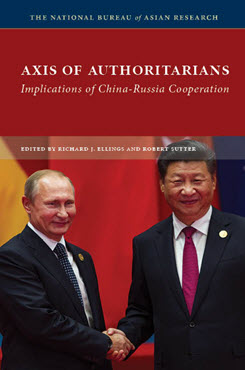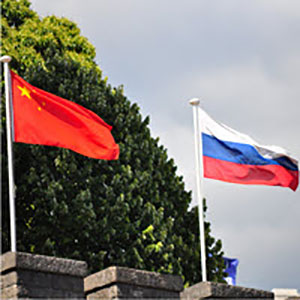The Strategic Context of China-Russia Relations
This chapter places into historical and strategic perspective the known and potential significance to the United States of China-Russia strategic cooperation.
EXECUTIVE SUMMARY
MAIN ARGUMENT
As authoritarian, nationalist powers, China and Russia share interests and cooperate to weaken the U.S. and the other democracies. The two regimes perceive strategic opportunities in the changing global and regional balances of power to enhance their influence abroad. They share interests in subverting many of the values and rules that are embedded in the post–World War II order, such as freedom of navigation and skies, the free flow of information across borders, international rule of law, and international institutions. As nations that covet different regions—Asia and Europe, respectively—China and Russia have complementary interests that form their major strategic challenges to the U.S. Yet the two countries also have interests that conflict, stemming from their histories, competition for influence in Eurasia, disputed borders, and the widening asymmetry in their relative power. Their autocratic histories and ideological propensities suggest that China’s and Russia’s alignment calculations are apt to change when international and domestic circumstances make realignment advantageous.
POLICY IMPLICATIONS
- The perceived weakness of U.S. international leadership has encouraged Chinese and Russian aggression, which is often coordinated. Consequently, the fundamentals of U.S. and allied power, economic as well as military, require immediate and sustained attention.
- China-Russia strategic cooperation poses the worst-case threat to the U.S. due to the potential for the two to wage simultaneous wars in Asia and Europe, respectively. U.S. defense planners should make this scenario their top concern, both to mitigate this threat and to win the wars should mitigating policies, including deterrence, fail.
- Because Russian interests to align with China are mixed, and Russia exhibits major weaknesses that likely make it more susceptible to Western policies than China, there may be more opportunities to alter Russia’s alignment calculations than China’s.
Richard J. Ellings is President and Co-founder of the National Bureau of Asian Research (NBR) and Affiliate Professor of International Studies in the Henry M. Jackson School of International Studies at the University of Washington. He is a senior adviser to the NBR project “Strategic Implications of China-Russia Relations.”



